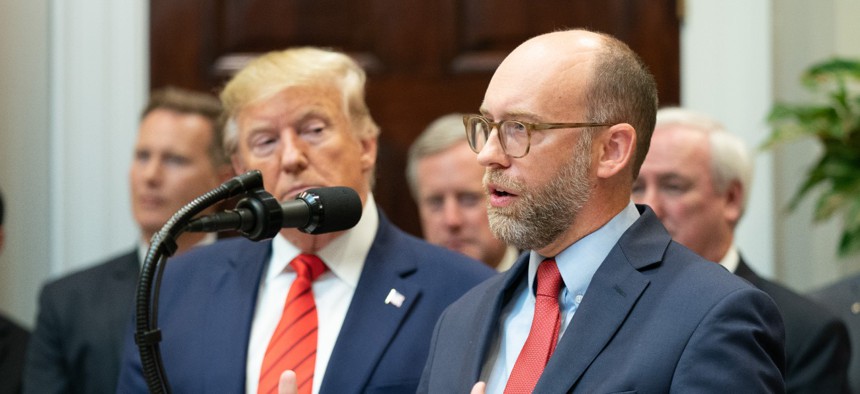
OMB Director Russell Vought, right, claimed that federal agencies make employees attend training sessions that teach critical race theory, an academic framework which studies how racism persists institutionally rather than as personal animus. Official White House Photo by Shealah Craighead
White House Moves to Redirect Funding for Some Diversity Training at Agencies
Citing unnamed “press reports,” OMB said some training conducted by agencies is “un-American” and sows division in the federal workforce.
The Trump administration last week called on agencies to excise some forms of diversity and inclusion training from their workforce training programs, calling the sessions “un-American propaganda.”
In a Sept. 4 memo to agency heads, Office of Management and Budget Director Russell Vought claimed that federal agencies make their employees attend training sessions that teach critical race theory, an academic framework which studies how racism persists institutionally rather than as personal animus. Although Vought cited “press reports” as the reason behind the memo, President Trump in recent days has tweeted about a segment on Fox News host Tucker Carlson’s show last week accusing agencies of “indoctrinating” federal workers in “Marxist rhetoric.”
“These types of ‘trainings’ not only run counter to the fundamental beliefs for which our nation has stood since its inception, but they also engender division and resentment within the federal workforce,” Vought wrote. “[The] president has directed me to ensure that federal agencies cease and desist from using taxpayer dollars to fund these divisive, un-American propaganda training sessions.”
Vought wrote that his office will issue additional guidance on the directive in the coming weeks, and said that in the meantime, agencies should identify offending training programs and seek to cancel those contracts.
“All agencies are directed to begin to identify all contracts or other agency spending related to any training on ‘critical race theory,’ ‘white privilege,’ or any other training or propaganda effort that teaches or suggests either 1) that the United States is an inherently racist or evil country or 2) that any race or ethnicity is inherently racist or evil,” the memo stated.
Joanna Friedman, a partner at the Federal Practice Group who represents federal employees in Equal Employment Opportunity Commission cases, said she was puzzled by the memorandum.
“In general, racial sensitivity training is conducted across much of corporate America, and it’s unclear to me why the federal government, which I think we would want to be an employer that leads by example, would be any different,” she said. “While it’s true that the federal workforce is already more diverse than most, the evidence still shows that the higher level management positions are held predominantly by white men, and that glass ceilings for women and minorities have yet to be pierced.”
Friedman said it seems like the president’s concerns are based on a misconception of what diversity and inclusion training, including programs focused on unconscious bias, actually consists of.
“The premise of diversity training for federal employees, like any workforce, is to assist in breaking down those barriers to help people understand the unconscious biases they bring to the table, whether it results in non-promotion of employees or promulgation of negative stereotypes,” she said. “You know, I guess what struck me in the memo is that I’ve never heard of any federal training class that teaches that the United States is an inherently racist or evil country, or that any ethnicity is inherently racist or evil.”
The memo also comes at a time when federal employee groups have renewed efforts to highlight ways in which racism still persists in the federal workforce. Last month, the American Federation of Government Employees released a survey of workers at the Veterans Affairs Department that found 76% of respondents had either experienced or witnessed “racially charged actions” against employees, and a coalition of employee associations at the Justice Department asked management to end the practice of asking for job applicants’ salary history, which they said contributes to pay disparities across different genders and ethnicities.
In a statement over the weekend, AFGE National President Everett Kelley blasted the memorandum as ill-informed and ill-timed.
“Diversity and inclusion programs in the federal government help us understand one another’s perspectives and build a workplace where every employee is treated with dignity, fairness and respect, regardless of their background,” Kelley said. “As racial injustice continues to rock this nation, we ought to be building more bridges of understanding. But all this president seems to know how to do is build walls of division.”
Although it remains unclear if or how the memo could be implemented across the federal government, given how close its release is to the end of the fiscal year and a presidential election, Friedman said it seems “counterproductive,” and could hamper the resolution of future EEOC complaints.
“Oftentimes when we settle EEO complaints in the federal government, one of the terms of our settlement will be that the alleged discriminators are required to take some type of diversity training, and often that training is focused on the type of discrimination that was the premise of the allegations,” Friedman said. “When an agency agrees to do this, they recognize that by having the official participate in this type of class, it will be beneficial and teach them better about the language or conduct that even got us to the situation of the complaint in the first place, and most importantly, it will serve to correct and prevent that type of action occurring in the future.”
Note: The headline on this story was changed to clarify the White House position on funding for diversity training.







